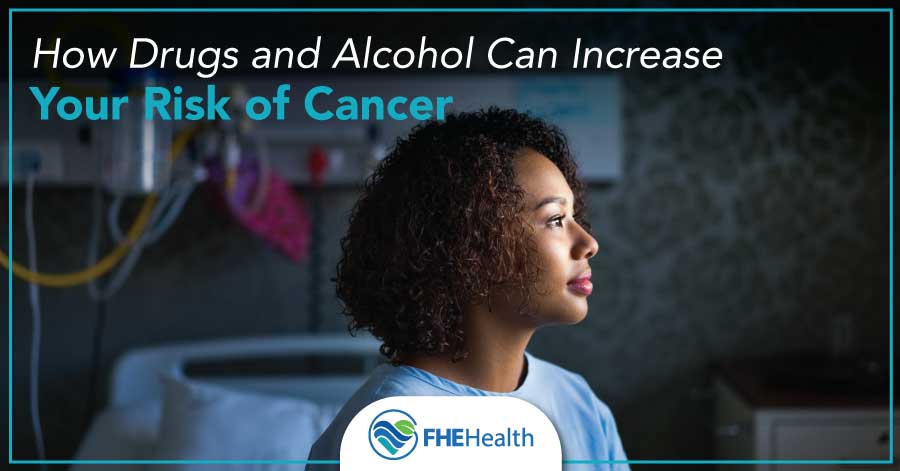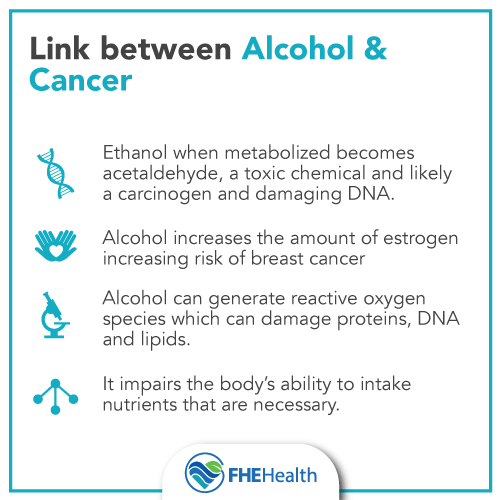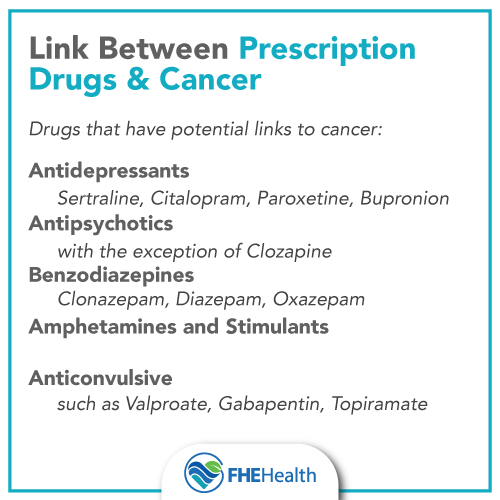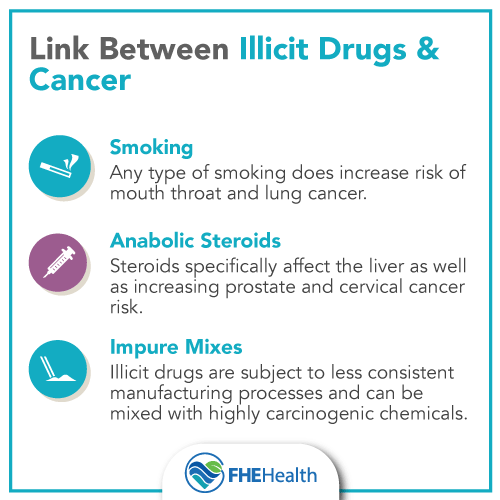
Can drinking alcohol cause cancer? Does smoking marijuana increase your risk of developing cancer? There’s a well-established link between cancer and drug addiction. Though most people recognize the psychological and physical damage these substances can create, many don’t think of the risk of cancer as a result of addiction.
It’s also true that those with cancer may be at a higher risk of developing a substance abuse disorder. This can occur due to the higher rate of depression in people with cancer that leads them to alcohol as a way to reduce their fears. There’s also a potential link between using illicit drugs for cancer’s symptoms and treatment side effects that may cause an addiction.
The Link Between Cancer and Addiction
Drug addiction brings health consequences with it. Many addicts suffer from illnesses such as heart disease, lung disease and cancer. Long-term drug use can cause a higher risk of these health conditions according to the National Institute on Drug Abuse. In some situations, it’s not clear why people who have substance abuse has a higher tendency to develop cancer. In others, it’s due to the way illicit drugs cause damage to the organs and tissues of the body.
Alcohol and Cancer
There’s a well-established link between cancer and alcohol abuse. Those who drink alcohol, even what may be considered social drinking, may be at a higher risk for developing cancers. The National Cancer Institute points to several potential reasons for this:
 When the body metabolizes the ethanol in alcohol, it becomes acetaldehyde. This is a toxic chemical and a likely carcinogen that damages proteins and DNA.
When the body metabolizes the ethanol in alcohol, it becomes acetaldehyde. This is a toxic chemical and a likely carcinogen that damages proteins and DNA.- Alcohol increases the amount of estrogen present in the body. This, in turn, creates a higher risk for developing breast cancer.
- Alcohol can also generate reactive oxygen species, which creates oxidation. This can damage proteins, DNA and lipids in the body.
- Alcohol also impairs the body’s ability to take in nutrients that are necessary to support the immune system’s ability to fight cancer. This includes the vitamin B complex nutrient folate, vitamin C, vitamin A and vitamin D.
Additionally, some beverages contain carcinogenic contaminants. Some fermentation and production processes introduce asbestos fibers, nitrosamines and hydrocarbons, all of which can cause cancer.
Prescription Drugs and Cancer
 In some situations, prescription drugs themselves may increase a person’s chances of developing some forms of cancer. For example, those who are taking menopausal hormone replacement therapy may be at a higher risk of cancer.
In some situations, prescription drugs themselves may increase a person’s chances of developing some forms of cancer. For example, those who are taking menopausal hormone replacement therapy may be at a higher risk of cancer.
There’s also evidence that some psychiatric medications may put people at risk of developing cancer. While those who need these medications shouldn’t stop taking them due to this risk, they should work with their doctor to reduce exposure when possible. A study found that the following drugs are potentially carcinogenic, though there isn’t yet definitive proof:
- Antidepressants such as sertraline, citalopram, paroxetine and bupropion
- Antipsychotics, though clozapine does not seem to have a link
- Benzodiazepines, with specific concerns about clonazepam, diazepam and oxazepam.
- Amphetamines and stimulants
- Anticonvulsive such as valproate, gabapentin and topiramate
Most of these risks are minimal, and they may not apply to your situation. Don’t stop taking your medications until you speak to your doctor about these risks because the side effects of not taking prescribed medications can be more worrisome.
Cancer Drugs Involved in Addiction
Another key concern is the use of pain medications as a treatment for cancer. People who suffer through the debilitating pain of cancer and its treatments may need to use prescription painkillers, including opioids, to help reduce their symptoms. This should be done with significant monitoring from your doctor. Because of their addictive effects, prescription painkillers can create a risk of developing a dependency over time.
The National Cancer Institute provides guidelines on the treatment of pain in cancer patients. In light of the recent opioid epidemic, many doctors are moving to non-opioid pain treatment methods to help patients avoid addiction risks. Non-pharmacological solutions, cognitive behavioral therapy, physical therapy and massage therapy are a few of the things doctors are suggesting to avoid addiction. If you are taking pain medications for cancer-related pain, speak to your doctor about how to reduce your risks.
Illicit Drugs and Cancer
 Will smoking weed cause cancer? Could injecting heroin create a higher risk? Any time you smoke a substance, you are creating a risk of cancer.
Will smoking weed cause cancer? Could injecting heroin create a higher risk? Any time you smoke a substance, you are creating a risk of cancer.
This includes mouth, colon, throat, stomach, blood and bladder cancers, among others. Consider marijuana as an example. The Substance Abuse and Mental Health Services Administration found increased risks of developing head, neck, lungs and respiratory cancer in those who use marijuana. It’s also more likely to cause testicular cancer in young men.
Anabolic steroids, which are commonly abused, can also increase the risk of cancer, according to the same organization. Specifically, they can impact the liver due to the liver’s job of processing and removing substances like this from the body. Prostate cancer and cervical cancer risks are also elevated in those who use anabolic steroids.
Injectable drugs, such as heroin, can also be a concern. Injecting carries a higher risk of hepatitis B and C, which are linked to liver cancer according to some studies.
Other concerns include what’s mixed in with drugs. Cocaine, for example, is sometimes cut with materials that are known carcinogens. For example, safrole is often used during the manufacturing of MDMA. This substance is a direct cause of cancer in the human body, according to the U.S. National Library of Medicine.
The chemicals used to manufacture meth are the same as those found in cigarettes, increasing the risk of cancer development.
How the Lifestyle of an Active Addict Makes Cancer Diagnosis Difficult
Cancer and drug addiction have a clear link. Yet, for an addict, cancer symptoms may not be readily noticed early on. In some situations, there’s even the risk of spending months with prominent symptoms but not recognizing the potential link to cancer. For example, you may begin coughing up blood but attribute it to your drug use instead of recognizing that it’s a sign of cancer.
Additionally, active addicts simply don’t go to the doctor. They don’t receive routine screenings to ensure they are healthy because they worry about their behaviors and the legal risks. This makes it more likely for cancer to worsen and go without treatment.
What to Do If You Need Help for Addiction Now
Stopping substance abuse at any time helps to reduce your risk of developing cancer, though there’s no guarantee of what the future may hold. Getting help now is your best chance. At FHE Health, our compassionate counselors are available to get you the help you need immediately. Call us 24 hours a day at (833) 596-3502.






